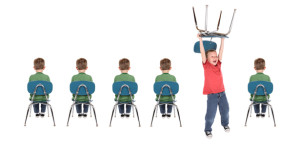ADHD – What does it look like?
ADHD – What does it look like?
Do you think your child has ADHD? Your child may be inattentive in class, or fidgety. Or perhaps they often do things without thinking about the consequences. Perhaps they’ve been labelled “naughty” or “troublesome”.
Your child may be high spirited or easily distracted because their thoughts are elsewhere, or their lack of forethought may be due to immaturity or inexperience. So how do you know if your child truly has ADHD?
Symptoms of ADHD
Attention Deficit Hyperactivity Disorder, more commonly referred to as ADHD, is a combination of behaviours that can severely affect a child’s social interaction and learning ability and can cause family disruption and stress. It generally consists of any combination of three separate symptoms: inability to concentrate or inattention, hyperactivity and impulsive behaviour.
Hyperactivity
This seems to be the most troublesome symptom for younger children and their families. Hyperactive children often require constant supervision and have difficulty interacting with their peers, often disrupting games or being over physical to the point of unintentionally hurting their friends. Carers are often driven to distraction by the need to intervene in games or squabbles.
Symptoms may include:
- Fidgeting and jiggling, constantly fiddling with things, door handles, TV knobs.
- Inability to sit on one place, squirming in their seat, uncomfortable in the car.
- Need for constant physical stimulation, running through a shopping centre, climbing on shelves.
- Is overly noisy and talks all the time, can’t listen to a story or favourite program, pre-empts questions and interrupts.
- Lacks boundaries, interrupts others games, takes others’ toys, intrusive.
- Impatient, can’t play games, wait for his turn or a future activity.
Inattentiveness
Inattentiveness can cause problems with learning. The school environment demands that a child listen and complete tasks within a given time, both activities are difficult for a child with ADHD. Even if the child is made to repeat the request back to the carer and clearly understands the task, they will often resist having to concentrate and will avoid completing the task as it’s “too hard” or say they “can’t do it” when it’s clearly within their capacity.
Symptoms may include:
- Doesn’t pay attention to instructions, has to be told “look at me”, is regarded as a dreamer.
- Is disorganised and loses things, school hat, lunchbox, soccer boots.
- Has trouble concentrating and finishing work, homework, or simple chores.
- Has difficulty following instructions, even when understood.
- Is easily distracted or side tracked completely so that they are unable to come back to the task at hand.
Impulsiveness
Impulsiveness can be one of the most stressful symptoms of ADHD for some carers as it can cause the child to put themselves and others in dangerous situations. Mild symptoms are as simple as interrupting someone, however, impulsiveness may result in actions that are inappropriate and, at their extreme, dangerous.
Symptoms may include:
- Constantly interrupting someone talking or trying to work
- Running off in the park or disappearing in the shopping centre
- Inappropriate reaction to another child, frustration or anger causing the child to shout or even hit another.
- Over excitement leading to inappropriate behaviour.
- Intrudes on others’ activities without thinking, regarded as “pushy”.
It’s important to understand that most children will exhibit some of these behaviours some of the time. Social anxiety, excitement, inexperience, unfamiliar surrounding are some factors which may contribute to a child needing guidance. Physical factors may cause similar symptoms, hearing disorders, dyslexia or other learning disorder.
If you suspect that your child may have ADHD it’s important to get a professional diagnosis as soon as possible, preferably before they start school. Early intervention can make a huge difference to your child’s success both academically and socially and can reduce stress for carers and other family members.
If your child doesn’t have ADHD, that in itself can be a starting point for either further investigation or referrals, if recommended. Sometimes, of course, a carer just needs reassurance that, in fact, there’s nothing wrong at all and you have been blessed with a human dynamo!

